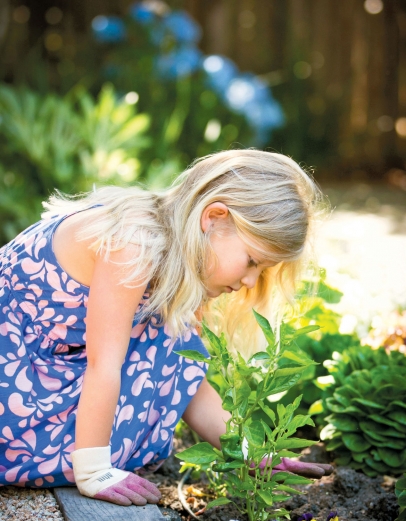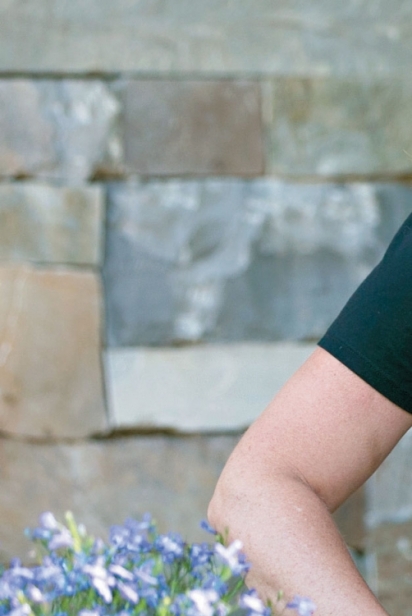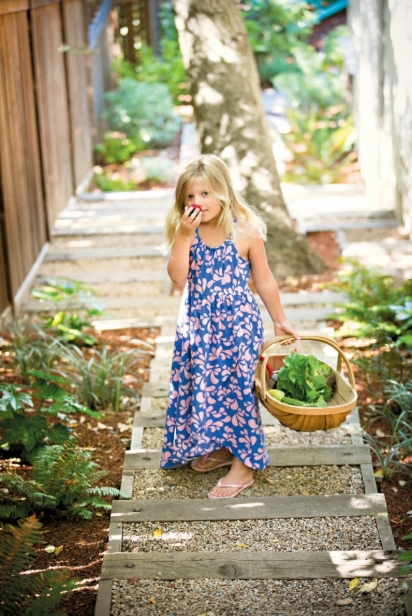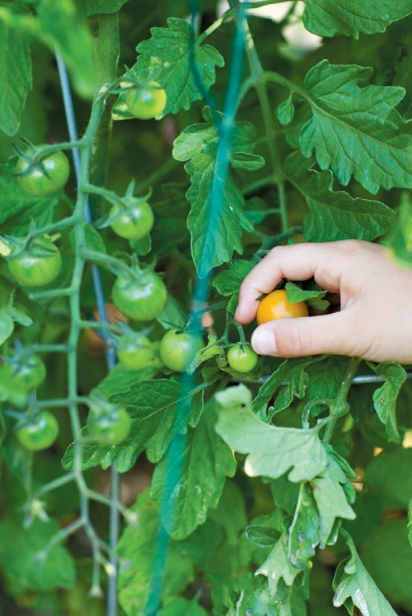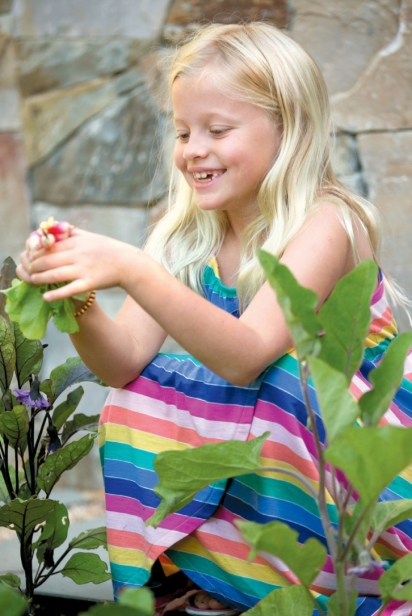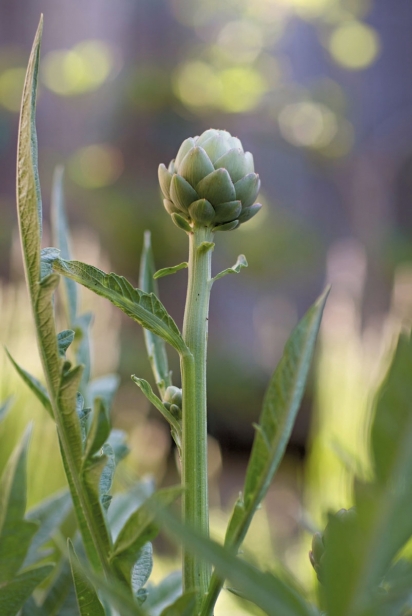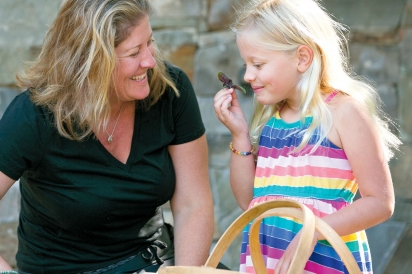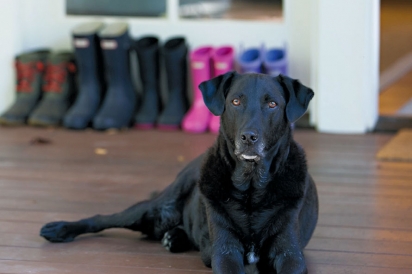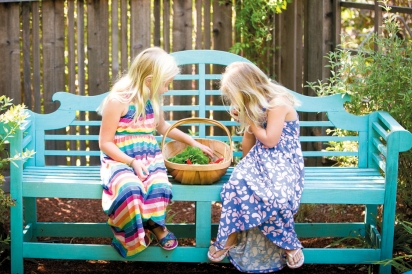Dig It: FAMILIES GO OFFLINE, GROWING FOOD AND CONNECTIONS
A black Labrador named Cooper lumbers around trying to find the best place to sleep on a warm afternoon in Mill Valley as his owner, Ashley MacDonald, and her gardening mentor, Amy Rice-Jones, meander through the terraced front yard of Ashley’s sloping 8,000-square-foot lot, reviewing plants growing in waist- high planter boxes.
Small bicycles and a few toys are strewn across the yard, along with empty vegetable start trays and a pair of Felco shears, their bright red grips still open—signs of recent gardening activity.
Amy, who is chief farming officer of The Backyard Farm Company, often comes by after school lets out so that Ashley’s two daughters—Poppy, age 6, and Gracie, 8—can participate in the hands-on mentoring sessions.
“Poppy loves digging in the soil to find worms and then squeals with delight when she finds a fat, wriggly one and happily plucks it from the soil and watches it curl and twirl in her hand,” Amy says. “Then she likes to find a good place, next to a plant, to put the worm back. Poppy also loves to give new transplants plant food and tuck them into the soil. Watering is perhaps her favorite task, as she gets to get wet, as well.”
Ashley and Elvin MacDonald and their daughters moved to their modern farmhouse-style home two and half years ago. In the time since, with the help of Marin-based The Backyard Farm Company, Ashley has evolved from an absolute beginner gardener to understanding the importance of soil health, the fine line between too much and too little watering, and how proper harvesting promotes more growth.
“I wanted an outdoor environment that allows my family to go barefoot and eat food straight from the garden at all times of the year,” she says.
Ashley and her family now not only grow much of the food that they eat, but her newfound gardening proficiency ripples out into the broader community through her support of the garden at her daughters’ Montessori-inspired K–8 school.
Christian Douglas, a British expat and founder of The Backyard Farm Company, spearheaded the design of the oasis at the MacDonalds’ home. Christian brought his 15 years of experience designing gardens at English country estates and his knowledge of dryland agriculture and food production to the project, suggesting that the MacDonalds install a garden in the tradition of French potagers and English kitchen gardens, small plots designed explicitly for growing food.
The MacDonalds agreed, and The Backyard Farm Company team set to work crafting the large raised beds retained by elegant stone walls and wood in the MacDonald’s front yard, filling them with vegetables and herbs.
The MacDonalds’ mini farm changes according to the seasons. In the spring, chamomile, oregano, parsley, sage and lemongrass were mixed in with vegetables including Nelson carrots, cipollini onions, King Richard leeks, artichokes, romaine lettuce, fava beans, broccolini and sugar snap peas. Strawberries, too. In the summer months, they grow Sun Gold and Black Krim tomatoes, eggplant, a wide variety of peppers, Italian Romano beans, Genovese basil, butterhead lettuces, strawberries, pickling cucumbers and yellow crookneck squash.
The ability to walk outside your own front door and harvest this bounty sounds like a no-brainer, but while edible landscapes are becoming more popular in our area, and across the country, some homeowners have been nervous to commit, often because they are worried that they don’t know how to care for vegetables.
This is where the mentoring services offered by The Backyard Farm Company and others, like Avalon, the Sonoma County–based company we featured in the Spring 2018 issue of Edible Marin & Wine Country, make all the difference.
The MacDonalds’ mentor, Amy Rice-Jones, has a long history of helping others grow their own food. She studied at UC Santa Cruz’s Center for Agroecology and Sustainable Food Systems, and was further trained by famed Zen gardener Wendy Johnson at the College of Marin’s Indian Valley Farm. Later, she founded an educational farm at Petaluma Bounty, an organization whose mission is to make healthy food available to all. She also served as the farm production manager at Pie Ranch in Pescadero.
As the two women progress through the MacDonalds’ garden on the day of my visit, Ashley notices that the broccolini has blossomed. “The flowers are edible,” Amy says. “You can sauté the flowered broccolini, and it’s delicious.”
When the women arrive at a bed of kale that has grown nearly waist high, its absurd size breaks the serious tone. (Our climate allows some vegetables to become perennial, continuing to grow year-round.) “My husband came home from the grocery store the other night with a bunch of kale,” Ashley says. “I looked at him and laughed.”
The conversation continues while they inspect two meticulously espaliered apple trees and discuss the practice of “summer trimming vs. winter running,” as it relates to pruning. Amy explains the importance of creating a poly-culture understory for the fruit trees— plants that attract beneficial insects and bees that cross-pollinate and eat pests, while also creating richer biodiversity in the soil as the understory plants will help decompose fallen fruit tree leaves. They have selected English lavender for their understory here.
The MacDonalds’ property does not have a lot of room to grow food, but they have discovered it’s plenty.
“Our success is measured not only by the beauty of an engaging outdoor environment, or how much food is grown, but by how many people learn to grow food,” says Christian. “Now Ashley and her family are learning to grow food as our forefathers would have done. In many cultures throughout the world, this knowledge is still passed on within the family, maintaining a connection and reverence for traditional foodways. Sadly, in the US and other ‘modern cultures,’ this critical link to food security is being lost as we spend more time glued to digital screens.”
Just like the American Colonists who maintained mostly small farms to produce food for their own families, Ashley’s gardening connects her family to the likes of Thomas Jefferson, who is said to have harvested a head of lettuce each day and then immediately sowed the seeds for a new one. Ashley will soon “graduate” from The Backyard Farm Company’s “hands-on” mentoring curriculum, but she and her family will continue to have the support of the team through a monthly video call. The Backyard Farm Company offers three levels of service that range from the full-support “Farm Pro” package that includes planning and planting, as well as continued in-person mentoring on a regular basis, to “as needed” help after initial planning and planting.
“Amy has held my hand throughout the whole process, while teaching us to do it on our own,” says Ashley. “I’ve learned that it’s OK to take risks in the garden, some plants are going to work and some will not.”
Gardening Roles Grow as Kids Do
Gardening tasks are easily tailored to different age groups, experience levels and physical abilities. Amy Rice-Jones and Christian Douglas of The Backyard Farm Company have experienced firsthand that their clients, especially young children, have an instinctive connection to growing their own food— planting and nurturing edible gardens connects them with the natural world, building confidence as well as growing food. Here are some ways to get the entire family engaged in the garden:
• The Backyard Farm Company clients the Tempesta-Wycoff family say their teens and pre-teens are especially keen on growing and harvesting pizza topping ingredients from their family’s yard in Sonoma, including San Marzano tomatoes that family patriarch Giovanni dries in the sun and jars with basil, garlic, rosemary, mint, oil and vinegar.
• The Haynor family of San Rafael grows food in a small plot at the bottom of their sloped front yard. The curbside location of the veggie patch provides an opportunity for the family to connect with neighbors and even chat with strangers as they pass by on their way to the nearby park. In the family’s backyard, they grow lettuces and cucumbers, as well as snap peas for easy snacking as elementary-aged daughter Catlin likes to do as she mows the lawn. Catlin also helps with gardening, digging holes for planting and fertilizing the newly installed vegetable starts. She has also discovered that store-bought tomatoes are not nearly as tasty as those from the garden.
• The Haynors’ son Caden, a middle-school student, says the garden inspired his school science project: a garden box specifically designed to grow items that can be enjoyed straight from the vine, like snap peas and cherry tomatoes. The family also incorporates produce from their garden into bake sale items, raising funds for the kids’ schools.


